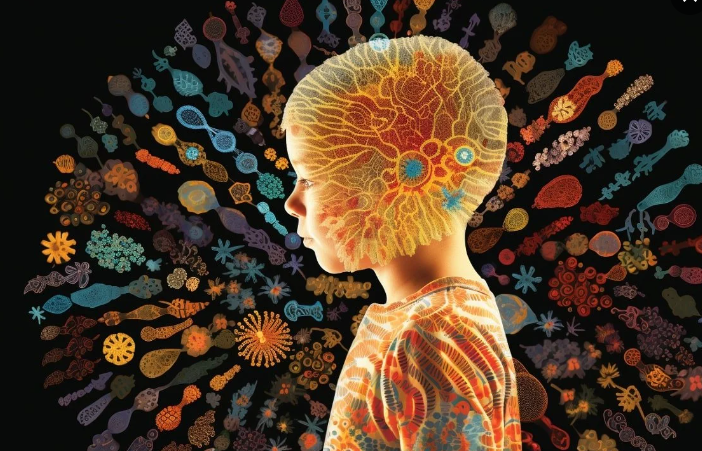Autism Spectrum Disorder (ASD) is a complex neurodevelopmental condition characterized by challenges in social interaction, communication, and restricted or repetitive behaviors. While the precise roots of ASD remain elusive, emerging research suggests that the gut microbiome, the collection of microorganisms residing in the gut, plays a significant role in the development and management of this condition. In this article, we discuss the complex interaction between ASD and the gut microbiota, including specific pathways and metabolites, as well as how maintaining good gut health might improve behavioral characteristics and overall quality of life.
The gut-brain axis connects the gut microbiome to the brain via neuronal, endocrine, and immunological pathways. Communication occurs via neuronal, hormonal, and immunological communication, which influences a variety of brain functions such as mood, cognition, and behavior. Disruptions in this axis have been implicated in various neurological and psychiatric disorders, including ASD.
Consistent research has been observed to indicate that individuals with ASD generally have different gut microbiome composition and function than neurotypical individuals. These changes could contribute to gastrointestinal symptoms typical for individuals with ASD, such as abdominal pain, constipation, and diarrhea. Furthermore, the gut microbiota has been related to immunological dysfunction and inflammation, both of which are associated in the pathophysiology of ASD.
Several pathways and metabolites have been implicated in the interaction between the gut microbiome and ASD. Dybiosis, or microbial imbalance in the gut, can cause changes in short-chain fatty acid biosynthesis, neurotransmitter synthesis, and immunological regulation. Short-chain fatty acids, such as butyrate, acetate, and propionate, are produced by gut bacteria through fermentation of dietary fiber and play essential functions in maintaining gut barrier integrity, regulating immune function, and influencing brain health.
Gut bacteria also play a role in the production of neurotransmitters such as serotonin, dopamine, and gamma-aminobutyric acid (GABA), all of which are necessary for mood regulation, social behavior, and cognitive functioning. Dysregulation of these neurotransmitter systems has been linked to the development of ASD. Furthermore, gut microbes are capable of producing metabolites that modulate immune responses and inflammation, potentially contributing to the systemic inflammation often observed in individuals with ASD.
Maintaining a healthy gut microbiota through dietary interventions, probiotics, and prebiotics may improve ASD-related behavioral characteristics. Supplementing with probiotics, which are live microorganisms that provide health benefits when consumed in sufficient quantities, has been shown to improve gastrointestinal symptoms and reduce ASD-related behaviors such as irritability, social withdrawal, and repetitive behaviors.
Dietary interventions aimed at promoting gut health, such as increasing fiber intake and consuming fermented foods rich in beneficial bacteria, may positively influence mood and cognitive function in individuals with ASD. These therapies, which promote neurotransmitter production and reduce inflammation, may help to ease ASD symptoms and enhance overall quality of life.
Finally, the gut microbiota contributes significantly to the pathogenesis of Autism Spectrum Disorder by influencing immunological function, neurotransmitter production, and inflammation. Understanding the complex interaction between ASD and the gut microbiome allows us to investigate novel therapy options for altering gut microbial communities to enhance gastrointestinal symptoms and behavioral outcomes in people with ASD. Maintaining gut health may provide prospective pathways for improving the well-being and quality of life of people with ASD.
It’s important to consult with healthcare professionals before implementing dietary interventions or supplementing with probiotics, as individual responses may vary. Further research is warranted to fully harness the therapeutic potential of modulating the gut microbiome in ASD management.

Further Reading:
Gut microbiota and autism spectrum disorders: where do we stand? : https://tinyurl.com/6td9jrch
Role of Gut Microbiome in Autism Spectrum Disorder and Its Therapeutic Regulation : https://tinyurl.com/bdex496c
Multi-level analysis of the gut–brain axis shows autism spectrum disorder-associated molecular and microbial profiles : https://tinyurl.com/ey99em7w
Autism-related dietary preferences mediate autism-gut microbiome associations : https://tinyurl.com/ytxmsfsz
Autism Spectrum Disorder Associated With Gut Microbiota at Immune, Metabolomic, and Neuroactive Level : https://tinyurl.com/36t4n5un